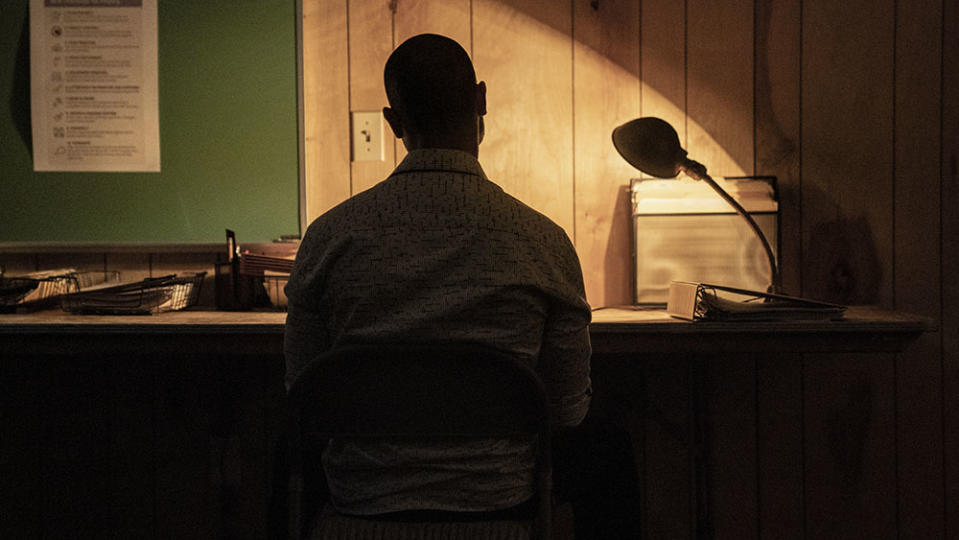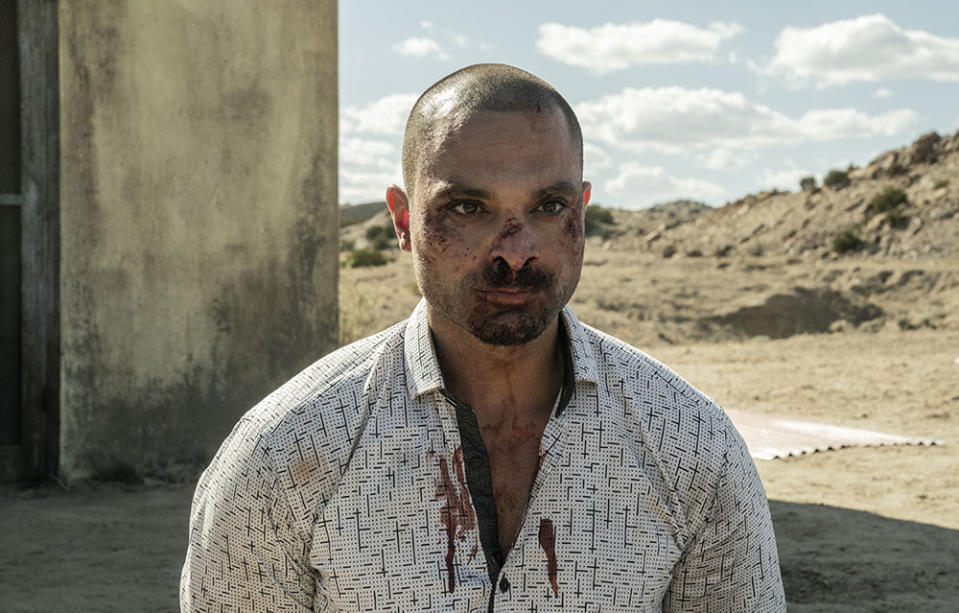‘Better Call Saul’ Star Michael Mando Dissects Emotional Ignacio “Nacho” Varga Episode
- Oops!Something went wrong.Please try again later.
- Oops!Something went wrong.Please try again later.
- Oops!Something went wrong.Please try again later.

[The following story contains major spoilers for Better Call Saul episode, “Rock and Hard Place.”]
“No, it wasn’t me! It was Ignacio! He’s the one!”
More from The Hollywood Reporter
Imax Inks Two-Theater Deal With Japan Cinema Giant Aeon (Exclusive)
'Better Call Saul' Writer-Director Gordon Smith Breaks Down Devastating Third Episode
Cannes Names 2022 Competition Jury, Vincent Lindon Jury President
Thirteen years ago, Breaking Bad viewers first heard the name Ignacio as Saul Goodman blamed him for something he presumably did to Lalo. Well, on tonight’s tragic episode of Better Call Saul, fans finally learned how Ignacio’s (Michael Mando) story ended.
In the closing moments of the Gordon Smith-helmed episode “Rock and Hard Place,” Ignacio “Nacho” Varga sacrificed his life for the life of his father (Juan Carlos Cantu), and like the episode’s title, Ignacio truly found himself between a rock and a hard place.
If he was captured by the Salamancas, he’d be tortured until he gave up the intel that Gus Fring (Giancarlo Esposito) was responsible for the attack at Lalo Salamanca’s (Tony Dalton) compound. In season four, Gus strong-armed Ignacio into being a double agent, and ever since then, he’s been helping him undermine the Salamancas’ drug trafficking operation and Don Eladio’s (Steven Bauer) cartel. So naturally, Gus also wanted Ignacio dead to protect his own long-running revenge plot against the men responsible for killing his beloved partner, Max (James Martinez), during a season four flashback on Breaking Bad.
Ultimately, Ignacio struck a deal with Gus that had him trade his life for the protection of his father, however, instead of being shot in the back by Gus’ henchman Victor (Jeremiah Bitsui) during a parley with the Salamancas, Ignacio broke free long enough to grab Juan Bolsa’s (Javier Grajeda) weapon, say his piece and take his own life.
“In the iconography of the character, it is the most truthful thing to do. It’s incredibly tragic. It’s Shakespearean, but it’s what makes the character iconic. He lived and died for true love. It gives me shivers just thinking about it,” Mando tells The Hollywood Reporter.
During his final days on set, Mando was also quite moved by the Better Call Saul crew’s tributes to the character. “They surprised me by wearing Nacho shirts to set, and everybody had these tear tattoos. It was just so emotional for everybody. I knew the character meant so much to them, but I didn’t know how much he meant to them until that moment,” Mando shares.
In part two of a recent conversation with THR, Mando also recounts all the “ominous” occurrences that seemingly wanted to prolong his tenure on the Breaking Bad AMC prequel/sequel.
Ignacio chose to go out on his terms after being controlled by multiple monsters for so long. What did you make of his decision and his ultimate farewell?
In the iconography of the character, it is the most truthful thing to do. It’s like Romeo and Juliet. It’s incredibly tragic. It’s Shakespearean, but it’s what makes the character iconic. He lived and died for true love. It gives me shivers just thinking about it. He believed in purity and virtue, and he sacrificed his life despite being offered power, money and influence. To turn it all down and do the right thing makes a really honorable character. And it’s done in such an excruciating and truthful way, so I think the writers did a masterful job.
What stands out from your final days on set?
The episode is full of these larger-than-life moments. Right before my first day of shooting, I cut my finger. (Mando holds up his scarred hand.) I couldn’t move my hand. I couldn’t feel any nerves shooting up from my left hand, so I had to wait a week before I could shoot.
The day we shot the desert stuff, the cameras were on Gus and the Salamancas first. And right as we were supposed to turn the cameras on me, out of nowhere, this gigantic sandstorm hit us. So we had to literally run back before our cars sank into the sand. When I came home the next day, lightning had struck the tree in front of my house, and the fallen tree blocked my entry into the driveway. So many ominous and larger-than-life things happened that made it so special to me and the crew.
They surprised me by wearing Nacho shirts to set, and everybody had these tear tattoos. It was just so emotional for everybody. I knew the character meant so much to them, but I didn’t know how much he meant to them until that moment. So the crew was right there with me, and it was a magical sendoff.

Greg Lewis/AMC/Sony Pictures Television
After years of biting his tongue, Ignacio finally told the Salamancas, as well as Gus, how he really feels about them. Did you provide a variety of different flavors on the day? Or was each take pretty consistent?
When the cameras were on them, the takes were very different. But because we had a day to think about it, I got a note from [writer-director] Gordon [Smith], and he had me play it completely differently by the time the cameras turned around on me. At first I was a bit resistant to the note, but then I finally got it. [Ignacio’s] heart is being weighed in front of the audience. It’s kind of weird because we know how every single person in that scene, without exception, gets killed, and they’re all there to witness [Ignacio’s] death.
It’s very clear he’s walking into his death, and the audience is also there to witness his death. It felt like he was on trial, and to me, that trial was, “How deep is your father’s love?” That’s what I think he was being tried for. “How pure is your heart in terms of wanting to do the right thing?” For the first time, he has no fear of any of these people. He also puts his ego aside and is completely willing to tell the story that will save his father, regardless of what anybody else thinks. And finally, his gesture is very brave. There’s not an ounce of regret or doubt or second-guessing. So he really was wholeheartedly committed to sacrificing himself.

Required fields are marked * Restricted Type None Site Restricted Single Use Allowed in Feeds Yes No Allowed in Newsletter Yes No Image Credit Ex. Jane Smith/Shutterstock Image Source URL Image Source Publicity Image Source Ref Notes
Did you expect an outcome like this from the very beginning?
When I first got this part, I wanted to honor the New Mexican culture, and it was really important for me to play a character that was not a stereotypical brown-skinned bad guy. And I remember wanting to go all the way back to the histories of the Aztecs and the Mayans. And then I saw a documentary that didn’t portray them in the best light. They said that they believed in human sacrifice. They would commit human sacrifice for the Gods to bring down the rain, and it sounded very barbaric. And then I heard a Latin American historian tell that same story, but he left out a really important detail. The strongest men in the village competed in a sport that the whole community watched, and it was the winners who willingly sacrificed themselves for the Gods to bring down the rain.
So their relationship with life, death and the afterlife was very, very different from our Western understanding and fear of death. It wasn’t so much about if you die, it’s about when you die and what you die for. So I thought it was unbelievably beautiful that the episode starts with the rain falling down on this purple flower that also symbolizes enlightenment.
Some of my favorite Better Call Saul scenes involve Ignacio and Manuel Varga. Were you and Juan Carlos Cantu present for each other’s side of that devastating final phone call?
I asked that there be no one there for my side of the call. I didn’t play that scene to Juan Carlos; Rich [Sickler], the AD, read those lines off camera to me. And he did the same thing for Gus and Mike’s phone call. Juan Carlos wanted me to be there for his coverage, so I was happy to be there and support him for that. I thought the character of Nacho had gone through so much, and no one really understood where he was at. He also never really wanted his father to see the reality of what he was going through, so in that moment, I thought it would be ideal if Juan Carlos wasn’t there.
Well, thank you for my favorite Saul character, Michael.
Honestly, your words have made my day, and more than that, they’re making me very emotional. The character means so much to me, and hearing you say that validates all the sacrifice and effort and fills me up with gratitude.
The interview has been edited for length and clarity.
Better Call Saul airs Mondays on AMC.
Best of The Hollywood Reporter

